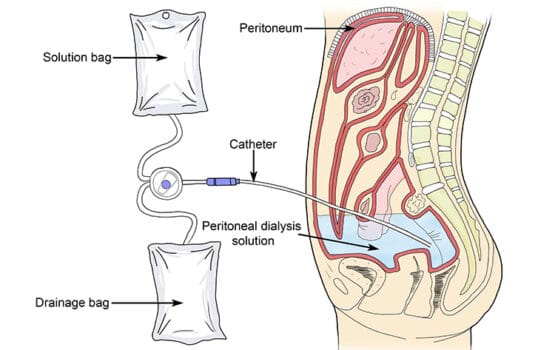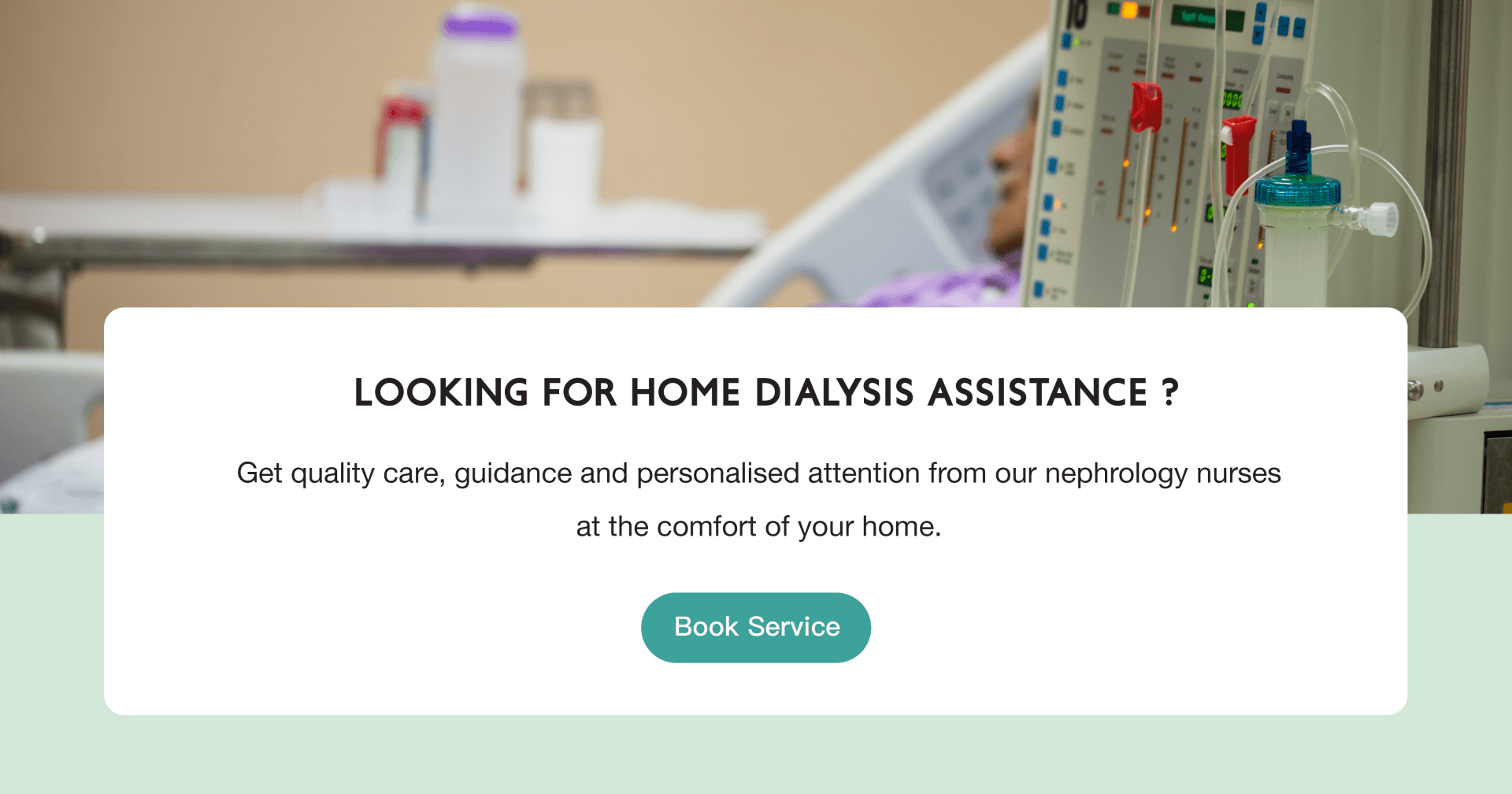While both peritoneal dialysis and haemodialysis are options for kidney disease, they are very different from each other. Time, cost, preparation, convenience and side effects are all factors you to consider when choosing between the two. If your family member requires professional at-home support, please feel free to contact us so that we can find you a professional nurse within 24 hours to assist with dialysis set up and guidance.
The fundamental difference between peritoneal dialysis (PD) and haemodialysis (HD) is the part of the body they target in treatment. PD uses the peritoneum as a filter to extract excess waste and water from the blood, whereas HD directly extracts blood from the body, then filters and cleans it in a machine called the dialyser.
A comparison of both types of treatments has been made below, to help you make a decision on the right treatment for you.
1. How much time does dialysis take?
2. How much does dialysis cost?
3. What preparation is needed before I start dialysis?
1. How much time does dialysis take?
Haemodialysis
Haemodialysis is administered in a clinic or hospital. Each session takes approximately four hours, three times a week. There is less flexibility in terms of scheduling because patients need to work around the clinic’s schedule. During the session, the patient is machine-bound and unable to tend to regular activities of daily life.
Peritoneal Dialysis
Peritoneal Dialysis is much more convenient and flexible than HD. There are two types of PD: Continuous Ambulatory Peritoneal Dialysis (CAPD) and Automated Peritoneal Dialysis (APD). Both can be administered at home. When patients undergo CAPD, they need to deliver and drain dialysate in and out of their abdominal cavity manually, whereas this dialysate exchange is done automatically in APD while the patient is asleep.
For CAPD each round of dialysate exchange takes 20-30 minutes, and the dialysate remains in the abdominal cavity for around 4-8 hours. During this time, the patient is able to go about their daily lives. For APD, four to five rounds of dialysis exchange is done automatically throughout the night by an APD machine, so the patient can go to work or school as normal in the day as well. The only procedure needed for both CAPD and APD is connecting the machine to the PD catheter before bed\ and separating the machine from the catheter when waking up, taking up a total of 40-50 minutes.
2. How much does dialysis cost?
Government-subsidised healthcare costs
According to the Hospital Authority (HA) website, public hospitals provide PD or HD treatment at a rate of $96 per session. If the patient needs an overnight hospital stay, an extra $75 will be charged, and the subsequent hospital stay fee is $120 per day. Although public hospital treatment fees are significantly cheaper than private services, the demand for these services are extremely high and many patients need to travel across districts multiple times each week because of a lack of PD or HD quota near them. In response, the HA has launched the Haemodialysis Public-Private Partnership Programme to increase the quota for haemodialysis services, allowing patients to benefit from community-level clinical services at public hospital prices.
Private hospital and clinic costs
If a patient wishes to do dialysis at home, they can rent or purchase their own dialysis machine. Purchasing an APD machine can cost up to $84000, but some organisations do lend out machines to low-income patients for free. Private hospitals provide haemodialysis for no less than $1950 per session, not including doctor’s consultation fee, hospital stay fee and more. Private patients also spend anywhere between $6000 and $24000 per year on medication.
The following are a few examples of public hospital, private clinic and private hospital fees for dialysis for your reference:
* The above information is only for reference, all dialysis centres and hospitals may change their pricing at any time, and it is recommended that you call these service providers for their latest pricing information.
Home dialysis can improve the quality of life and overall well being of patients. Learn more about Evercare's home care services and our nurses' hourly rates to learn more about how our health professionals we can provide dialysis support at home.
3. What preparation is needed before I start dialysis?
Preparation for Peritoneal Dialysis and Haemodialysis
Both PD and HD require a high degree of preparation before starting the first session. This includes scheduling, dietary restrictions and surgery. Preparations can take a few months.
Pre-dialysis surgery
Before starting PD and HD, patients must undergo a catheter placement surgery or a vascular access surgery. The latter involves a surgically created vein on the arm that is later used to remove and return blood during haemodialysis.
Dietary arrangements
There are few dietary restrictions for PD patients, but many more for HD patients. Strict restrictions are placed on potassium, salt, protein and water intake. It is highly recommended that new dietary restrictions are set in place before dialysis begins, to reduce the shock of undergoing treatment. Dialysis patients may consult dieticians for an in-home diet assessment, which allows a bespoke meal plan to be made depending on preferences, schedules and lifestyle.
you might also like :
4. How convenient is dialysis?
One of the most obvious differences between PD and HD is the location of treatment. PD machines are portable and administered within 24 hours. APD machines allow patients undergo dialysis in the comfort of their own home, and presence of family members.
HD involves a large dialyser and is therefore not as mobile as PD. It is much more difficult for HD to happen at home, so most patients who choose HD use hospital and clinical facilities for treatment.
However, recent developments have allowed for an increase in people choosing at-home HD. Patients can now rent or purchase dialysers to perform HD at home in their sleep. Because the duration of HD is longer at home than in clinics, the dialysis is more thorough and blood is cleaned better. Patients do not have to worry about HD interfering with their activities in the day, increasing their quality of life. Studies have shown that at-home HD is 2.7 times more effective than centre-based HD, as it impacts patients positively in physical as well as mental health.
5. What are the possible complications of dialysis?
Haemodialysis
HD patients must first inject an anticoagulant before starting a session to prevent the blood being extracted from solidifying during dialysis. Using anticoagulant for an extended period of time may lead to degeneration of blood vessels in the eyes.
Every session of HD lasts four to five hours, during which the dialyser may extract two to three litres of water. This may lead to low blood pressure and affect heart rate, causing burden to the heart.
Other rare but severe complications include dialysis dysequilibrium syndrome, allergic reaction to the dialyser and vascular access and cramps.
Peritoneal Dialysis
One of the most common complications of PD is peritoneal infection, which happens when bacteria enters the abdominal cavity through the PD catheter. Other complications bleeding, high blood sugar and various issues relating to catheter placement.
PD patients’ sleep may also be affected by the noise from their PD machine.
We hope our article helps you make a decision on the options of HD or PD. If you have any questions, consult your doctor or contact us to hire a registered nurse to help build a care plan and set up dialysis at home.
Sources: Hospital Authority, Mackay Memorial Hospital, Mingpao, The Chinese University of Hong Kong, Mammoth Memory
其他話題 Other Topics
最新的文章 Latest Posts

喜歡我們的文章嗎?
超過3,000位照顧者已經訂閱我們的資訊!訂閱我們的資訊,你可獲得免費護理工具、專家護理知識和同路人分享。立即訂閱,也可以隨時取消。請在此填寫你的姓名和電郵地址:



